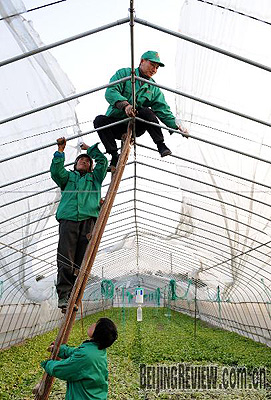|

This winter has been the nation's coldest since 1986, as measured by the lowest average temperature, a spokesperson for China Meteorological Administration said on February 18. From January 11 to February 14, the temperature averaged minus 7.6 degrees Celsius nationwide, 2.5 degrees below normal.
The winter was the most dramatic in China's history. Temperatures varied widely, hitting record highs in the first half of the winter and abnormal lows in the second half. Moreover, the month of freezing weather accompanied by heavy snowfall and sleet that gripped south China in the second half of January, killed 107 people and caused 111.1 billion yuan ($15.4 billion) in economic losses. In all, 21 provinces, autonomous regions and municipalities were affected.
As the emergency rescue work of evacuating residents from snow-crushed houses, de-icing roads and highways to unfreeze traffic jams and restoring power transmission facilities damaged by snow and sleet drew to an end, China's State Disaster Relief Commission and the Ministry of Civil Affairs lifted red alerts in seven provinces ravaged by the blizzards as of February 15.
"Currently, the Spring Festival traffic peak and the power grid reconstruction are going on smoothly, and the shortage of coal supplies for power plants has been eased," the Central Government's disaster relief agency said on February 16.
The situation in the seven southern regions, including Hunan, Hubei, Anhui, Guizhou, Sichuan, Guangxi and Jiangxi, has been gradually returning to normal, according to the special command. By February 15, traffic on major national highways once closed by the freezing weather was flowing normally.
The power on a Chinese north-south railway artery, which had been cut off by snow for more than 20 days stranding 136 passenger trains and over 100,000 passengers on the line or at stations along it, was completely restored on February 16.
The remaining rescue work is mainly restoration of power supplies and prevention of ensuing geological disasters, such as landslides triggered by melting snow. The Central Government ordered related local governments to do a good job in land management for reconstruction and in geological services for areas affected by the extreme winter weather. It also ordered that geological services should be enhanced for housing restoration in both urban and rural areas prone to geological disasters.
The government has asked its power grid companies to expedite efforts to get electricity back on for all snow-stricken regions by the end of March. The Central Government's disaster relief agency said in a Web notice on February 16 that the power companies could turn to the military if necessary and the command center would take charge of arrangements to ensure the supply of repair equipment and other materials. The notice said that there would be adequate restoration subsidies for local power grid firms.
China has sent three art troupes to five of its worst snow-stricken provinces, to "show the country's respect and gratitude to those still fighting against the snow storms," said the Ministry of Culture. The three troupes would stage 10 performances in Anhui, Jiangxi, Hunan and Hubei Provinces and the Guangxi Zhuang Autonomous Region from February 17 to February 20, said Huang Zhenchun, head of the General Office of the Ministry of Culture.
By February 13, the Ministry of Finance had allocated 9 billion yuan ($1.25 billion) as relief funds to areas affected by the severe winter weather, including 2.7 billion yuan ($375 million) in aid and 6.3 billion yuan ($875 million) in loans. The Ministry of Civil Affairs announced on February 7 that donations from people across the country totaled 1.02 billion yuan ($141.7 million).
Vice Minister of Civil Affairs Li Liguo said the government would likely spend more on relief efforts, without revealing the scale of further financial support. Li said his ministry had arranged a raise in subsistence allowances for low-income earners in urban areas. It will formulate reconstruction schemes for the disaster-hit areas in March and complete restoration work on collapsed housing before the end of June.
Restoration of agricultural production has been made a priority by both the Central Government and local governments in snow-affected areas. In a meeting discussing agricultural relief on February 19, Vice Premier Hui Liangyu emphasized that governments at all levels should attach great importance to providing material for the farm work in spring, in order to ensure good harvests throughout the year.
According to statistics of the Ministry of Agriculture, about 11.87 million hectares of crops in China were damaged by low temperatures, including nearly half of the cole planted, or 3.26 million hectares, as well as 2.81 million hectares of other vegetables, 1.26 million hectares of fruit trees and 584,000 hectares of wheat. Rising food prices, pushed up by snowstorm-inflicted accidents and traffic jams to an 18.2-percent increase in January, have sent China's consumer price index on an upward swing of 7.1 percent year on year, the highest in 11 years.
| 